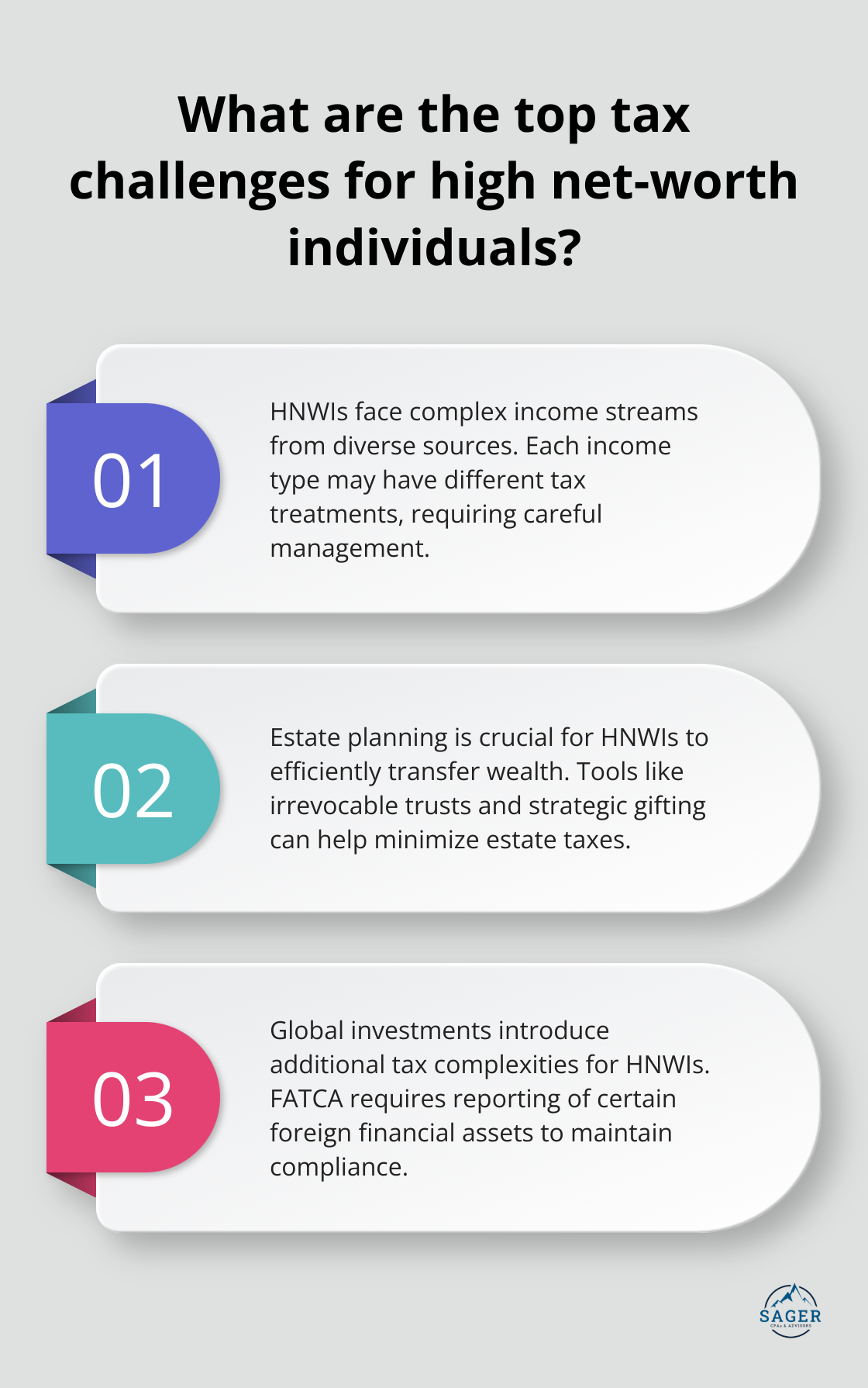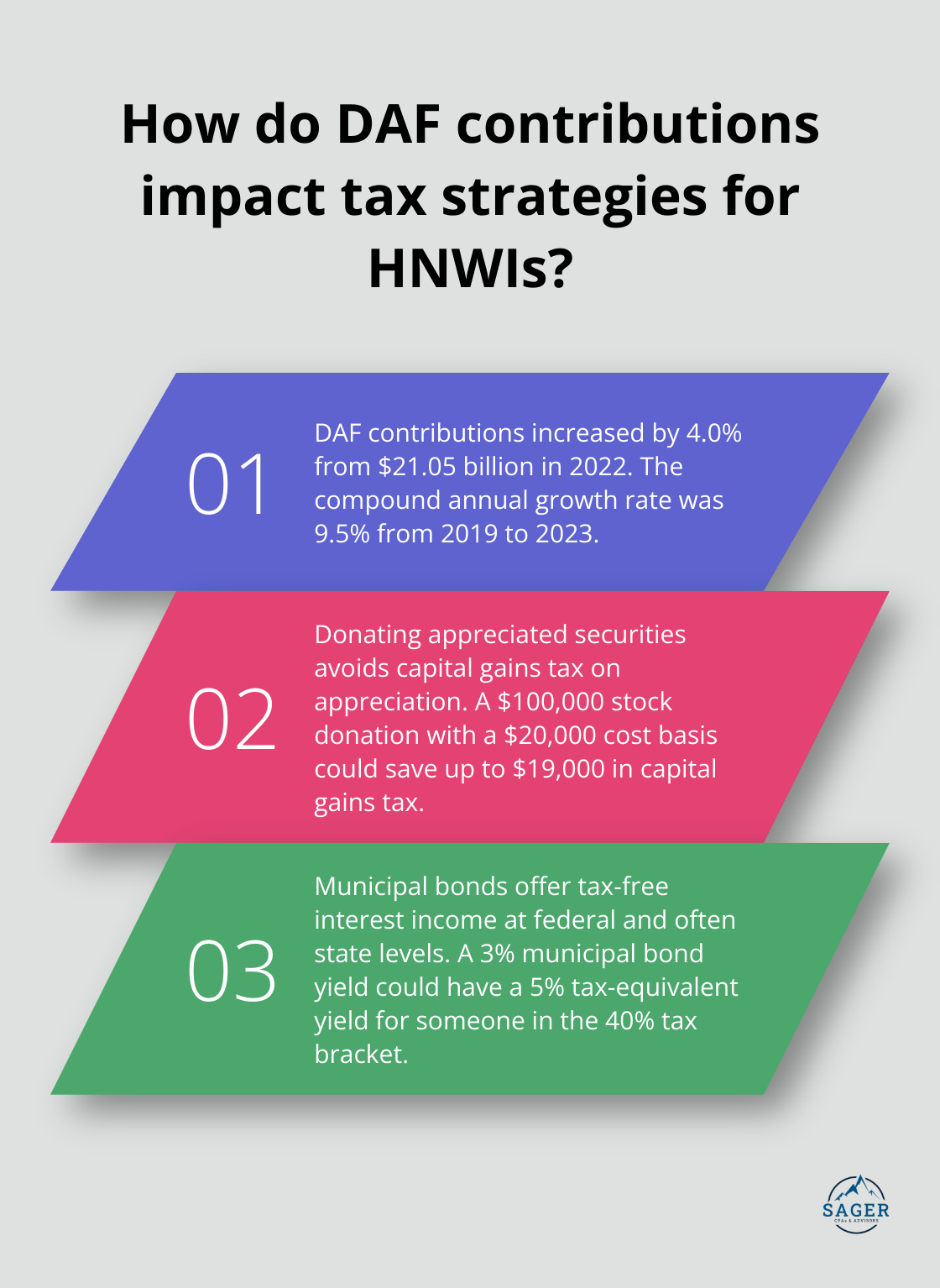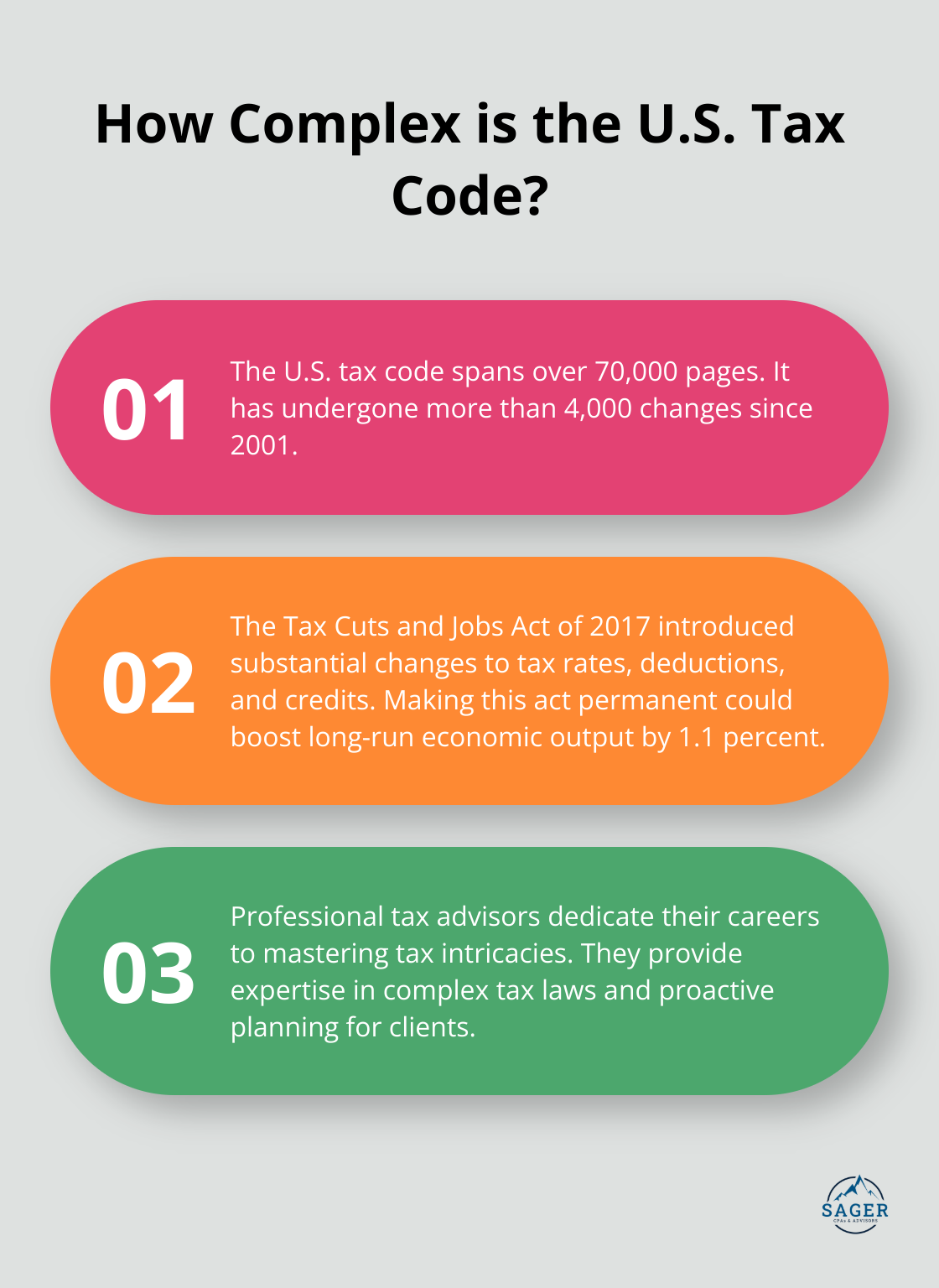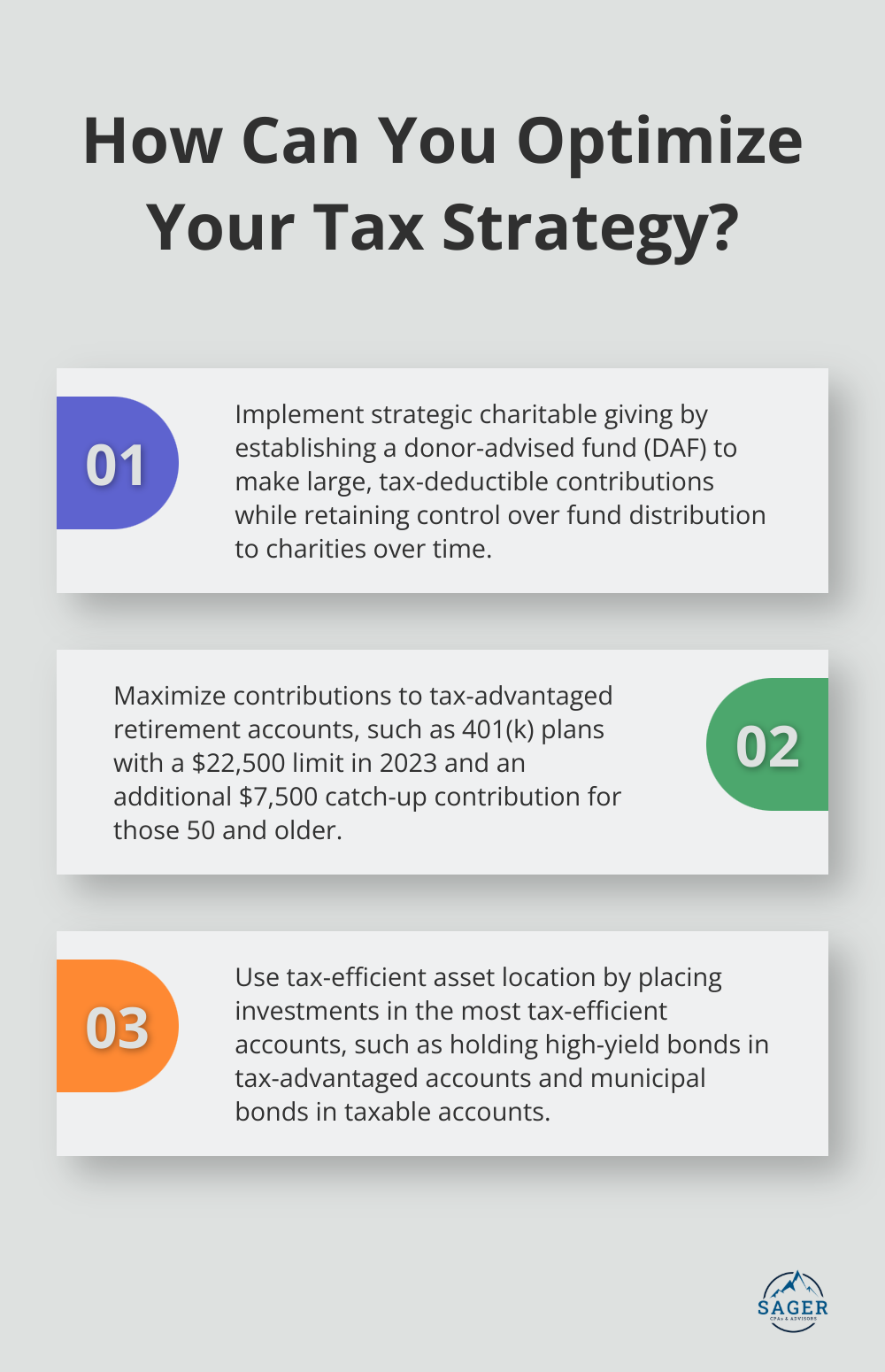
Tax planning for high net-worth individuals presents unique challenges and opportunities. With complex financial landscapes and ever-changing tax laws, it’s crucial to stay ahead of the curve.
At Sager CPA, we specialize in helping affluent clients navigate these intricate waters. Our expert strategies can significantly impact your financial future, from minimizing tax liabilities to maximizing wealth preservation.
High net-worth individuals (HNWIs) face a complex tax landscape that requires sophisticated planning and expert guidance. Their intricate financial situations create unique challenges that demand tailored solutions.
HNWIs often possess diverse income sources, including salaries, bonuses, investment income, and business profits. Each income type may incur different tax treatments, necessitating careful management to optimize the overall tax burden. For example, capital gains from investments typically attract lower tax rates than ordinary income, but the timing of these gains can significantly impact the final tax bill.
Estate planning remains a critical concern for HNWIs. The IRS provides information on how the estate tax may apply to taxable estates at death. This creates urgency for HNWIs to implement strategies that efficiently transfer wealth to heirs. Tools such as irrevocable trusts, family limited partnerships, and strategic gifting can help minimize estate taxes and preserve wealth for future generations.
Many HNWIs maintain international investments or business interests, which introduce additional tax complexities. The Foreign Account Tax Compliance Act (FATCA) requires certain U.S. taxpayers holding financial assets outside the country to report those assets. HNWIs must navigate tax treaties, foreign tax credits, and reporting requirements to avoid double taxation and maintain compliance with both U.S. and foreign tax laws.
The Alternative Minimum Tax (AMT) ensures that high-income individuals pay a minimum amount of tax. While recent tax law changes have reduced its impact, some HNWIs still find themselves subject to AMT, particularly those with significant deductions or who exercise incentive stock options. Understanding AMT triggers and planning accordingly proves essential to avoid unexpected tax liabilities.
These complex challenges underscore the importance of proactive tax planning and expert guidance for HNWIs. A comprehensive approach that aligns with each individual’s unique financial goals and circumstances can help navigate these intricate tax issues effectively. Investment planning becomes particularly complicated due to tax concerns, requiring practical strategies to make better financial decisions. The next section will explore effective tax planning strategies that HNWIs can employ to optimize their tax positions and preserve their wealth.

High net-worth individuals (HNWIs) have several powerful tools at their disposal to optimize their tax strategies. These methods can significantly reduce their tax burden while aligning their financial decisions with their long-term goals.
Philanthropic efforts support meaningful causes and offer substantial tax benefits. HNWIs can establish donor-advised funds (DAFs) to make large, tax-deductible contributions while retaining control over the distribution of funds to charities over time. The National Philanthropic Trust reports that DAF contributions increased by 4.0 percent from a revised amount of $21.05 billion in 2022, with a compound annual growth rate of 9.5 percent from 2019 to 2023.

Donating appreciated securities allows HNWIs to avoid capital gains tax on the appreciation while still claiming a deduction for the full market value of the securities. For example, donating $100,000 worth of stock with a cost basis of $20,000 could save up to $19,000 in capital gains tax (assuming a 20% long-term capital gains rate) while providing a $100,000 charitable deduction.
Municipal bonds offer tax-free interest income at the federal level and often at the state level for in-state residents. While yields may be lower than taxable bonds, the tax-equivalent yield can be significantly higher for HNWIs in high tax brackets. A municipal bond yielding 3% could have a tax-equivalent yield of 5% for someone in the 40% tax bracket.
HNWIs should maximize contributions to tax-advantaged retirement accounts. In 2023, the contribution limit for 401(k) plans is $22,500, with an additional $7,500 catch-up contribution for those 50 and older. Backdoor Roth IRA conversions can benefit from tax-free growth and withdrawals in retirement.
HNWIs can benefit from strategic income timing. This might involve accelerating deductions into the current year while deferring income to the following year. Business owners could delay billing for services or prepay expenses.
Installment sales can spread capital gains over multiple tax years. This strategy can be particularly beneficial for large asset sales, potentially keeping the seller in a lower tax bracket and reducing the overall tax burden.
Tax-efficient investing strategies involve placing investments in the most tax-efficient accounts. To master this approach, it’s essential to understand the two main types of investment accounts: taxable and tax-advantaged.
These strategies represent just a fraction of the available tax optimization methods for HNWIs. The next section will explore the importance of working with professional tax advisors to create a comprehensive and personalized tax strategy.
Tax laws change constantly, and understanding these changes requires full-time dedication. The U.S. tax code spans over 70,000 pages and has undergone more than 4,000 changes since 2001 (according to the Tax Foundation). Professional tax advisors devote their careers to mastering these intricacies and applying them to benefit their clients.

The Tax Cuts and Jobs Act of 2017 introduced substantial changes to individual and corporate tax rates, deductions, and credits. Making this act permanent would boost long-run economic output by 1.1 percent, but would increase the budget deficit. Tax professionals quickly adapted their strategies to help clients capitalize on new opportunities, such as the increased standard deduction and the qualified business income deduction for pass-through entities.
Professional tax advisors take a proactive approach, which stands as one of their most significant advantages. Instead of merely reacting to tax events after they occur, experienced advisors anticipate potential issues and plan accordingly. This forward-thinking strategy can lead to substantial tax savings and help avoid costly mistakes.
A skilled tax advisor might recognize that a client’s investment portfolio lacks tax efficiency. They could recommend restructuring the portfolio to include more tax-efficient investments, potentially saving thousands in unnecessary taxes each year.
High net-worth individuals face unique financial situations that require tailored solutions. Professional tax advisors take the time to understand specific circumstances, goals, and risk tolerance. They then craft customized strategies that align with the overall financial plan.
Estate planning serves as a prime example of this customization. An advisor might suggest using a combination of trusts, such as a Grantor Retained Annuity Trust (GRAT) or an Intentionally Defective Grantor Trust (IDGT), to transfer wealth to the next generation while minimizing gift and estate taxes. These strategies require careful consideration of individual family dynamics and financial goals.
Effective tax planning extends beyond a once-a-year event-it requires ongoing attention. Professional advisors monitor financial situations throughout the year, making adjustments as needed to optimize tax positions. This continuous oversight ensures preparedness for tax season and allows clients to seize opportunities as they arise.
For instance, when considering the sale of a significant asset, an advisor can help time the sale to minimize capital gains tax or suggest strategies like a 1031 exchange for real estate investments to defer taxes altogether.
Professional tax advisors transform tax planning from a dreaded chore into a powerful tool for wealth preservation and growth. Their expertise, proactive approach, and customized strategies (tailored to each client’s unique situation) provide invaluable support in navigating the complex tax landscape faced by high net-worth individuals.
Tax planning for high net-worth individuals requires expert guidance and continuous adaptation. HNWIs face unique challenges, including complex income streams, international tax implications, and estate planning concerns. Strategic charitable giving, tax-advantaged investments, and income timing techniques can significantly impact financial outcomes when applied correctly.

Proactive and ongoing tax management allows HNWIs to capitalize on new opportunities and mitigate risks. Sager CPA specializes in comprehensive tax planning services for high net-worth individuals. Our team employs cutting-edge strategies to optimize our clients’ tax positions and develop customized plans that address their unique financial situations.
Tax planning for high net-worth individuals demands expertise, dedication, and a forward-thinking mindset. With the right strategies and professional guidance, HNWIs can navigate the complex tax landscape effectively. Sager CPA provides ongoing support to help clients make informed decisions and create long-term financial stability.




Privacy Policy | Terms and Conditions | Powered by Cajabra
At Sager CPAs & Advisors, we understand that you want a partner and an advocate who will provide you with proactive solutions and ideas.
The problem is you may feel uncertain, overwhelmed, or disorganized about the future of your business or wealth accumulation.
We believe that even the most successful business owners can benefit from professional financial advice and guidance, and everyone deserves to understand their financial situation.
Understanding finances and running a successful business takes time, education, and sometimes the help of professionals. It’s okay not to know everything from the start.
This is why we are passionate about taking time with our clients year round to listen, work through solutions, and provide proactive guidance so that you feel heard, valued, and understood by a team of experts who are invested in your success.
Here’s how we do it:
Schedule a consultation today. And, in the meantime, download our free guide, “5 Conversations You Should Be Having With Your CPA” to understand how tax planning and business strategy both save and make you money.